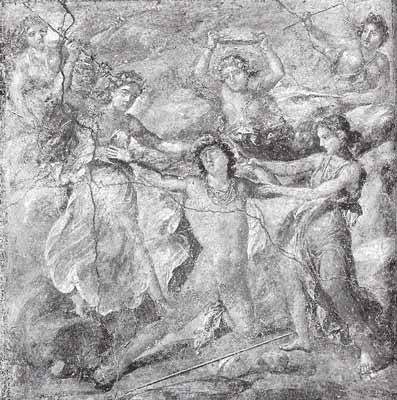|
|
 The Bacchae killing Pentheus The Bacchae is a tragedy by the ancient Greek playwright Euripides. It premiered posthumously at the Dionysia in 406 BC, where it won first prize. Characters and Setting Characters include: Dionysus, one of the Olympian gods, son of Zeus and Semele
Setting: The City of Thebes
The Set-Up The Dionysus in Euripides' tale is a young, spiteful god, angry that his mortal family, the royal house of Cadmus, has denied him a place of honor as a deity. His mother, Semele, was a mistress of Zeus, and while pregnant, she was killed by divine means. Most of Semele's family, however, including her sister Agave, refuse to believe that Dinoysus is the son of Zeus, and the young god is spurned in his home. He has travelled throughout Asia and other foreign lands, gathering a cult of worshippers (Maenads or Bacchantes), and at the start of the play has returned to take revenge on the house of Cadmus, disguised as a blond stranger. He has driven the women of Thebes, including his aunts, into a feral frenzy, sending them dancing and hunting on the mountain of Cithaeron, much to the horror of their families. Complicating matters, his cousin, the pompous young king Pentheus, has declared a ban on the worship of Dinoysus throughout Thebes.
Bacchic Dance, Dimitrios Biskinis The Plot The old men Cadmus and Tiresias, though not under the same spell as the Theban women, have become enamored of the Bacchic rituals and are about to go out celebrating when Pentheus returns to the city and finds them dressed in festive garb. He scolds them harshly and orders his soldiers to arrest anyone else engaging in Dionysian worship. The guards return with the disguised Dinoysus himself, who is locked up but, being a god, quickly breaks free and creates more havoc. Word arrives that the Bacchae on Cithaeron are behaving especially strangely and performing incredible feats, wearing live snakes as necklaces, nursing wild cubs, and making wine and water spring up from the ground and from stones. Dionysus decides to taunt his cousin further and convinces Pentheus to investigate the situation on the mountain himself, an undercover operation which requires the king to dress as a female Maenad to avoid detection. The god's vengeance soon turns from mere humiliation to murder. A messenger arrives at the palace to report that once they reached Cithaeron, Pentheus wanted to climb up an evergreen tree to get a better view of the Bacchants. The blonde stranger used magic to bend the tall tree and place the king at its highest branches. However, once he was safely at the top, Dionysus called out to his followers and showed the man sitting atop the tree. This, of course, drove the Bacchants wild, and they tore the trapped Pentheus down and ripped his body apart piece by piece. After the messenger has relayed this news, Pentheus' mother, Agave, arrives carrying the head of her son which she and the other Maenads pulled off. She has been driven so mad that she believes it is the head of a mountain lion; she proudly displays it to her father, eager to show off her successful hunt, and she is confused when Cadmus does not delight in her trophy. By that time, however, the spell is beginning to wear off, and as Cadmus reels from the horror of his grandson's death, Agave slowly realizes what she has done. The family is destroyed, Agave and her sisters are sent into exile, and Dionysus, in a final act of revenge, returns briefly to excoriate his family one more time for their impiety. A filmed adaptation of Euripides' The Bacchae, directed by Brad Mays, will be released in 2005. Links
Retrieved from "http://en.wikipedia.org/ "
 |
|
|||||||||||||||||||||

